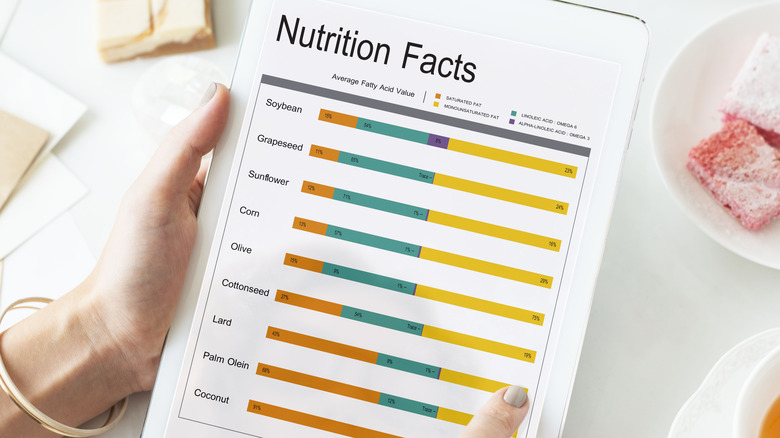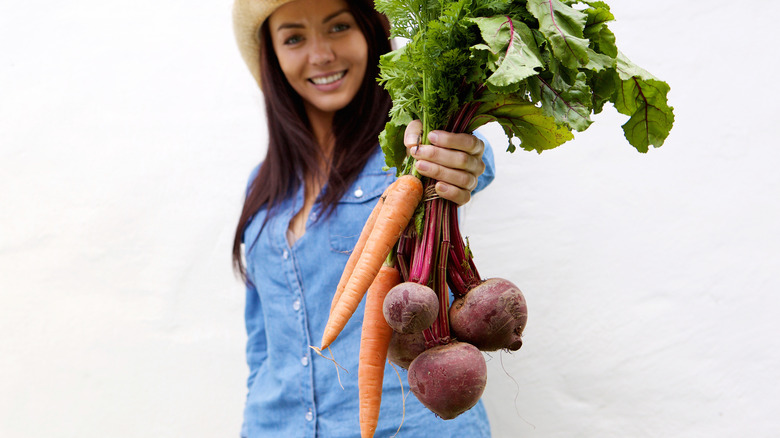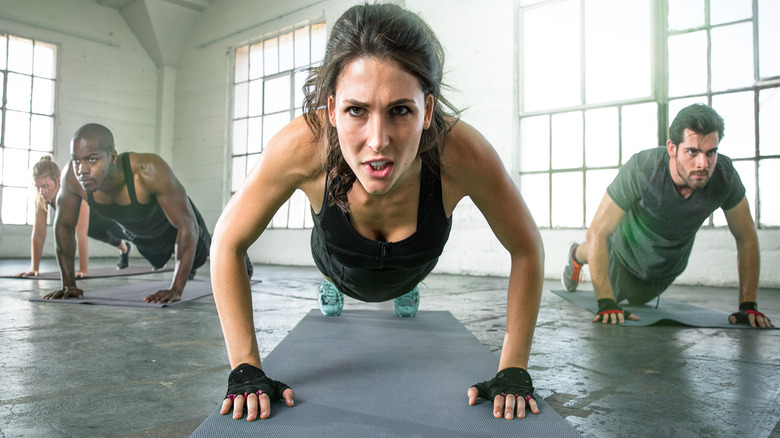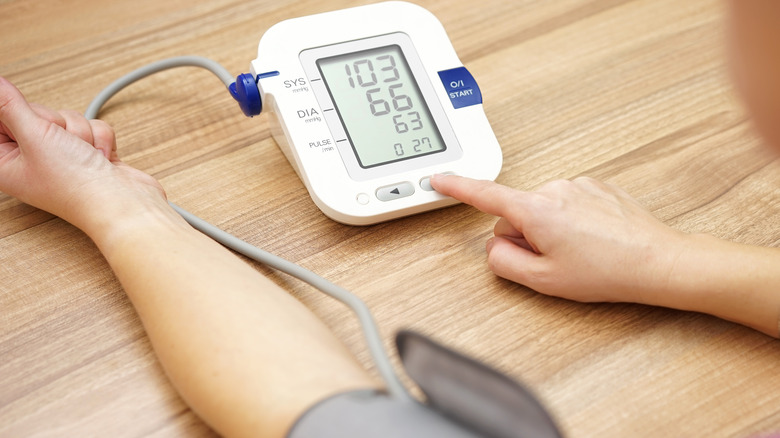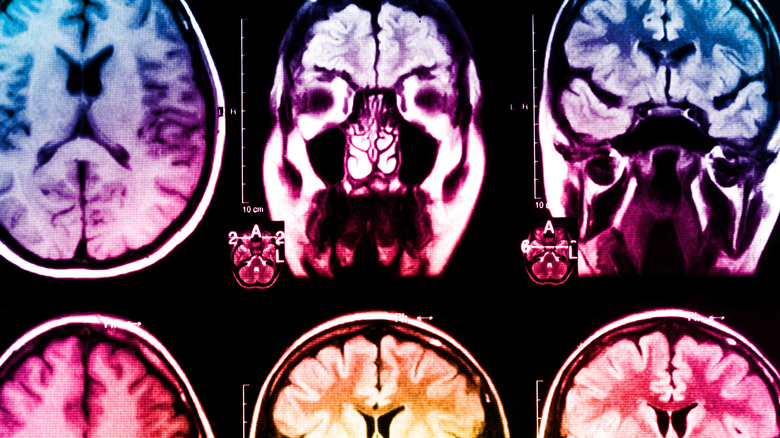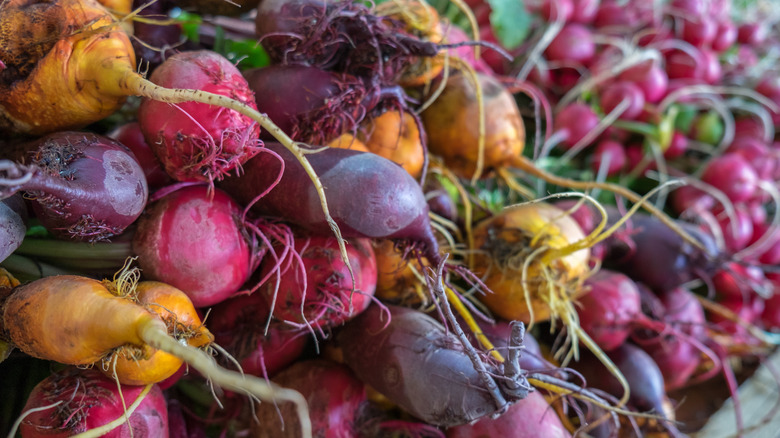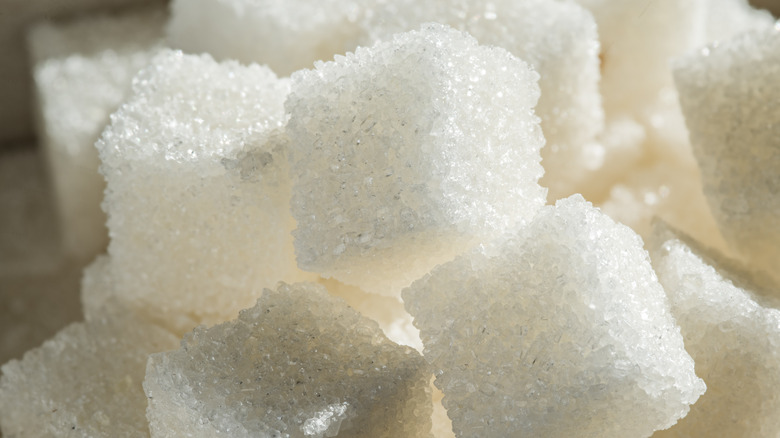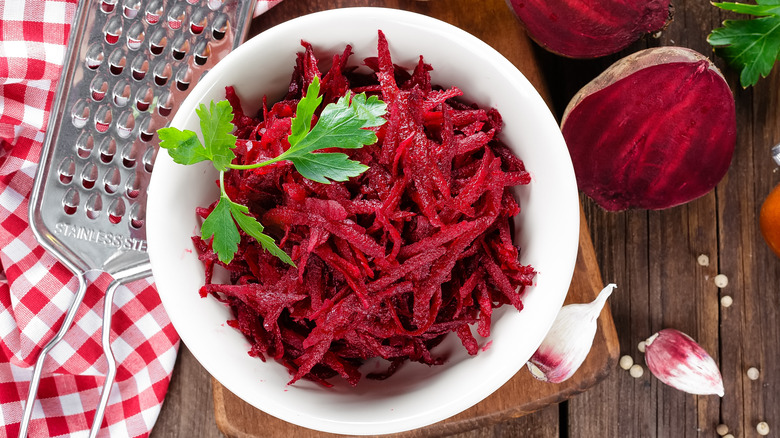The Real Reason You Need To Start Eating Beets
When I was a kid, the only vegetable I wouldn't eat was beets. My mother always bought them canned or jarred and I didn't like their slimy, earthy taste. I don't think she ever served fresh beets or presented them in an appealing way, so for years I didn't eat them.
I'm not sure what made me try them again, but maybe it was during nutrition school to become a Registered Dietitian, where I learned the deeper the color of a fruit or vegetable, the more nutrients it likely contains. The color of beets is definitely intense, which translates to them being incredibly high in vitamins and minerals, antioxidants, and phytonutrients.
Now, after trying them as an adult, beets are one of my favorite vegetables! If you aren't eating beets now, consider adding them into your diet. They can be quite tasty, prepared in a variety of ways, and pack a big nutritional punch.
They're packed with nutrients
Beets may seem intimidating at first with their long stems, thick skin, and reddish-purple color. You may have no idea how to even start eating or preparing them. The first thing you need to know is that the entire beet plant is edible, so you can't really go wrong. For the purposes of this article, I'll focus on the health benefits and research related to eating the beetroot, although the greens certainly have their own nutrition benefits.
First, beets are super low in calories, with only 35 calories per average size beet or about 60 calories per cup. One cup has about 13 grams of carbohydrates, pretty typical for a starchier root vegetable, but also 4 grams of fiber. They have little protein or fat, which is expected for a vegetable.
Vitamins, minerals, and phytonutrient content is where beets really shine. Beets are high in vitamins A, C, and B6. They are incredibly high in folate, lutein, zeaxanthin, iron, calcium, potassium, copper, phosphorus, and manganese. Beets are also high in a nutrient called betaine, which has been linked to a decreased risk of several chronic diseases, particularly those that affect the liver and heart. With all these nutrients, beets certainly pack a punch.
They help you feel full
Not only are beets low in calories, their fiber content will help you feel fuller longer, so you eat less overall. Fiber is unable to be digested by humans, as we don't have the enzymes necessary to break it down. Therefore, fiber adds volume to our food, without adding any additional calories. The quickest and easiest way to cut calories and lose weight, but still feel full, is to eat more high fiber foods.
Eating beets is a great way to start getting more fiber into your diet, since they have 4 grams per cup. Your goal for the day should be between 25 to 35 grams of fiber — and just a cup of beets will help you meet almost a fifth of your daily requirement.
They make exercise easier
Hate exercise? Feel like it's so hard you want to quit? Eating beets may make it a little easier. In a 2013 study, published in the Journal of Applied Physiology, 10 men consumed varying amounts of concentrated beetroot, or a placebo, before exercise. The subjects were then required to complete either a moderate or high-intensity bout of exercise within two and a half hours of consumption of the beet root. The men who consumed the greatest quantity of beetroot showed an improved physiological response to the exercise, meaning the exercise felt easier and their bodies responded better, when compared to those with a lower intake, or placebo. Beets increase levels of nitric oxide in the body, helping the body utilize oxygen more efficiently. Due to the increased oxygen consumption, high-intake subjects were able to exercise for up to 14 percent longer than the other groups.
Based on this research, beets may be an awesome pre-workout snack. They contain a bit of sugar to help fuel your workout and possibly even make it a little easier. If eating a whole beet before a workout seems weird (it kind of is) there are many options for beet juice or freeze dried beets, which are more portable. Consider pairing your beets with some protein, like string cheese or Greek yogurt, to give you sustained energy for your workout.
They're amazing for marathon training
Thinking about training for a 5k, marathon, or other type of endurance race? Beets are your best friend when it comes to training.
Ultramarathon runner and personal trainer, Teresa Magula, swears by beet powder or beet juice during her training season. She told me, "When I supplement with beet powder and/or juice, I find that I have greater efficiency over the long spans of training. In other words, I can run faster and longer with less perceived exertion. The sugars give me an immediate energy boost as well, and, being highly anemic, I love the extra iron."
If you are training for a race, a quick way to get the benefits of beets is to use beet root powder. You can add it to a smoothie or protein shake in the morning before a run. Teresa likes to add it to her pre-race pancakes for an extra boost of beet nutrition.
They reduce muscle recovery time
Beets are not only great for a workout, they also promote a faster recovery. A 2016 study in the European Journal of Applied Physiology, gave 30 physically active men varying doses of beet juice or a placebo for 24 and 48 hours after they completed 100 drop jumps. Various metrics were taken to determine inflammation levels and muscle recovery over a 72-hour period. Those who received the beet juice had less inflammation, quicker muscle recovery, and reported less soreness than those who received a placebo.
If you want some support with recovery after a tough workout, consider adding beets to your post-workout meal or drinking some beet juice. It may help lower inflammation and decrease overall muscle soreness, so you can get back to the gym sooner.
They lower blood pressure
A 2012 study, published in the Nutrition Journal, found that the increase in nitric oxide that occurs after eating beets may help lower blood pressure in healthy people. In this particular study, 30 men and women were given 500 grams of beetroot juice or a placebo. Blood pressure was measured every hour for a 24-hour period after consuming the juice. Systolic blood pressure was lower for six hours after consuming the beet juice, when compared to the placebo.
The nitrates in beets increase nitric oxide in the body, which helps blood vessels relax, lowering blood pressure. For people with high blood pressure, adding a glass of beet juice may be beneficial to helping them maintain healthier levels.
They improve brain function
Beets have been shown to be beneficial for maintaining brain function and warding off dementia. It is believed that lack of blood flow to the brain may be a factor in declining cognitive function as we age. Nitric oxide has been shown to help improve blood flow and may be beneficial to maintaining a healthier brain.
A 2012 study in Nitric Oxide found that when older adults were given a high, versus a low, nitrate diet there was a significant difference in how much oxygen was able to get into their brain, particularly in the frontal lobe. The frontal lobe is responsible for a higher level of brain function, such as complex tasks. Foods high in nitrates, such as beets, have the potential to help reduce the risk of age-related cognitive decline and dementia.
They're super easy to prepare
Beets are easy to prepare in a variety of ways. Consider grating them raw over a salad, like you would a carrot, for a little antioxidant boost. Pickled beets can also be added to a salad for extra antioxidants and flavor.
My favorite way to eat them is to roast them with a little olive oil, salt, and pepper. Goat cheese and a light vinaigrette make a great topper for roasted beets. You can also lightly steam them, or wrap them in foil and bake.
You can also consider juicing them. They add a bit of an earthy taste to any fresh fruit or vegetable juice. Recently, I have also noticed there are a lot of options for freeze-dried beets, similar to potato chips, that come in snack sizes. These are a great option for when you want beets on the go.
When choosing beets, avoid those with bruises or those that are leaking juice around the stem. They should be firm with smooth skin. And don't limit yourself to just the red beets, as they come in several different colors, all of which have health benefits.
They're not high in sugar
Since the early 19th century, beets have been used to make sugar. Due to the connection with sugar, many people believe beets themselves are high in sugar and therefore avoid eating them. This couldn't be further from the truth.
Yes, beets are higher in carbohydrates than some other vegetables, but that's because they're a root vegetable. Most root vegetables, such as potatoes or carrots, are going to be higher in carbohydrates because the plant is getting their nutrients from the root. The carbohydrates and sugar in beets is balanced out by the fiber and water content, reducing the effect they have on blood sugar. Although beets can be processed, refined and turned into white sugar, eating them won't raise your blood sugar.
They have one disconcerting side effect
I am not going to "beet" around the bush about this one. Beets have a weird side effect in a certain percentage of the population : they turn your pee and poop bright red — and it really can look like you might be dying.
I have personally had this experience and it can be quite terrifying. On a recent grocery trip, I found some delicious freeze-dried beets. I was so excited for such a healthy snack, I ate the whole package. A few hours later, when they were on their way out, I was horrified at what I saw. I was certain that I was dying. I called my husband in a panic, who immediately told me to go to the nearest hospital because if I was really losing that much blood, I was clearly going to die soon. Then, I remembered the beets! Luckily I hadn't yet gone to the ER. That would have made this story even more embarrassing.
The moral of the story is be prepared for this one weird side effect. You're not dying, it's just the deep red color of the beets you recently ate. It will only last a day or two and there is no cause for concern.
Feel the beet
Beets are an amazing nutritional powerhouse and if you aren't eating them, you really should give them a try! They're easy to cook, relatively inexpensive, and add a quick boost of nutrients to your day.
And who doesn't want to feel less sore after a workout? They can even help keep your heart and brain healthy. So, next time you are at the store, pick up some beets.
